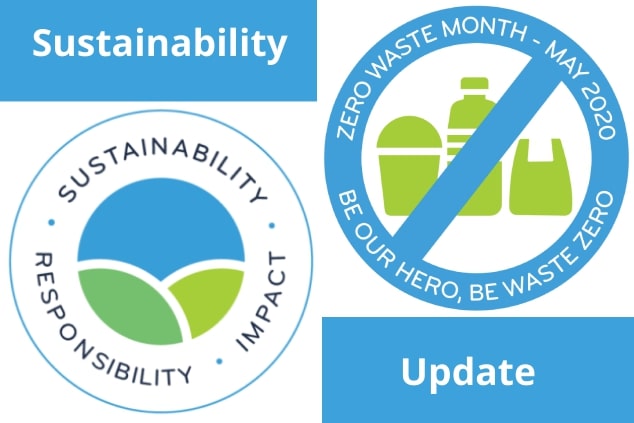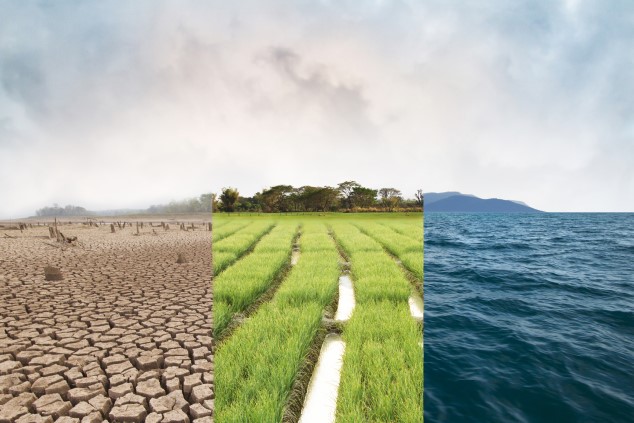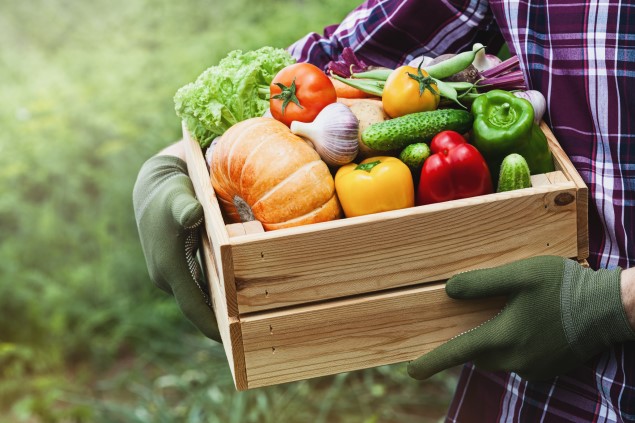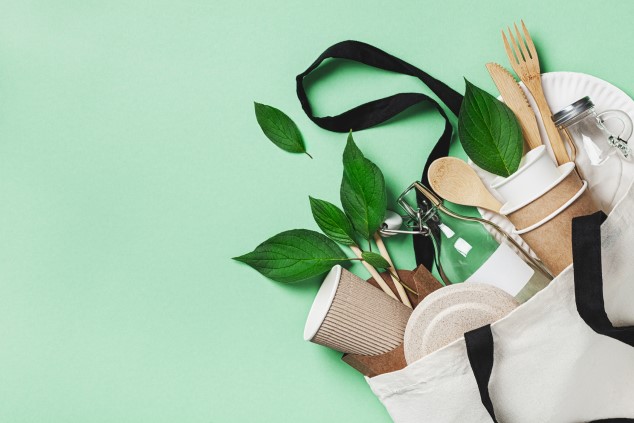In 1974, 5 June became World Environment Day, established by the UN to encourage worldwide awareness and action to protect our environment. That’s why today is the perfect occasion to present an update on the Sustainability Initiative at InterNations. In May, we organized our first theme month to get the team involved. “Be our hero — be waste zero!” was our motto. Here, we’re going to give you an overview of our activities for Zero Waste Month, as well as plenty of advice on how to reduce waste, both at home and at the office.

Reducing Plastic Waste and Carbon Emissions in One Go
The first blog post on the Sustainability Initiative outlined the three major goals InterNations has set for 2020: becoming a carbon-neutral office, cutting down on plastic waste, and increasing awareness of environmental issues among the team. After putting these topics on the agenda, our Feel Good Manager (and semi-official Sustainability Manager) Denise has been in touch with business contacts from several other companies to see what they are doing to become more environmentally friendly workplaces. Reducing their carbon footprint seems to be their top priority, since climate change is such a pressing issue.
At first glance, our extra focus on plastic waste might appear unusual. As Denise points out, these two problems are, however, inextricably intertwined. The production of fossil fuels, as well as the petrochemical industry in general, creates a lot of carbon dioxide, so reducing our dependence on plastic means reducing carbon emissions. “Plastic also has an extremely long-term impact on the environment. While we perceive climate change as one of the biggest environmental threats, plastic waste doesn’t have quite the same urgency. But everything we do, or don’t do, about it right now might haunt future generations,” Denise explains.

The Plastic Pollution Pop Quiz
Though plastic pollution is a rather serious topic, Denise and some of our team members, the InterNations SustainaBillies, came up with a light-hearted way of kicking off the theme month. As the first activity, Melody and Valentina from our Community Engagement Team hosted an online Plastic Pollution Pop Quiz during lunch, using this playful approach to bring some key facts and figures to our attention. While Melody’s questions focused more on the negative effects of plastic waste on marine animals, Valentina chose to highlight various facts that she’d learned during her research and that had stuck with her: “I knew, for example, that we don’t use plastic bags for very long. However, what I didn’t know was that the average bag is only in use for twelve minutes. But it then takes up to 500 years to decompose.”
Depressing facts notwithstanding, the participants from the InterNations team enjoyed competing for a set of sustainable prizes: a bamboo toothbrush, dental tabs (an alternative to toothpaste, sold in cardboard boxes rather than plastic tubes), and a package of reusable straws for the caffeinated beverages that fuel their working week. “I think we had really cool prizes for the winners. I almost wish I hadn’t been one of the hosts, so I could have competed myself!” says Valentina.

Plastic? Not Fantastic! — How the “5 R’s” Can Help
The week after the quiz, Alex — another Community Engagement Specialist and member of our SustainaBillies Group — gave an in-depth presentation on the problems with plastic, complementing the theory with a hands-on task. Everyone who signed up for his “Plastic? Not Fantastic!” workshop collected their household waste for an entire week and analyzed where the plastic in the trash came from. “It was humbling to see how much I, as a single person, throw away every day,” Alex says. “Once you collect your own trash for a week, you can’t avoid taking responsibility. There’s a moment when you just go, ‘Oh no! This is all my crap!’, you know?”
This task wasn’t just an exercise in extreme hoarding, but it also helped to highlight some statistics from Alex’ presentation. Since 1950, we (i.e. the whole of humanity) have created 8.3 billion tons of plastic; each year eight million tons of plastic waste get dumped into the ocean — the equivalent of 800 Eiffel Towers of trash. The lion’s share of new plastic produced every year stems from packaging material, which often gets discarded after being used just once, like the bag Valentina mentioned.
The so-called 5 R’s of the zero-waste movement go a long way towards eliminating single-use plastics — such as yogurt cups and soda bottles — from our shopping habits:
- Refuse to buy what you don’t need.
- Reduce what you need to buy.
- Reuse what you already own.
- Recycle what you need to throw away.
- Only leave to rot what cannot be recycled.
Alex discovered that he could avoid much of the packaging waste from his food consumption as a vegetarian. He and his roommates have now decided to order an Ökokiste, a weekly delivery of organic, regional, and seasonal produce that arrives in a wooden crate. “All of our decisions count,” he states. “It’s similar to how we’re expected to behave during the coronavirus pandemic. Let’s all do our bit to flatten the curve before things become critical. This might buy us enough time to find a technological solution for our waste management problem.”

A Pioneer of the Zero-Waste Movement in Munich
Gradually changing your lifestyle to become more sustainable was also the overarching theme of this month’s Long Live Learning Night, an interactive lecture and Q&A session hosted by an expert on zero waste: Chrissi Traub, one of the founders and owners of ohne, Munich’s first package-free and plastic-free supermarket.
With Chrissi, we’d found a knowledgeable and likeable guest speaker who is passionate about sustainability. She also emphasized, however, that she prefers leading by example rather than judging others for their shopping habits and consumer choices. She even joked about not looking like the cliché of a zero-waste store owner: “I actually had customers come into our shop and tell me that I look so different from what they’d expected. They probably assumed I’d be some kind of hippie with dreadlocks, a tie-dyed caftan, and Birkenstock sandals.”
Her family was at first a bit shocked when she gave up a safe and well-paid career to put all her energy, as well as most of her savings, into an eco-friendly business venture. Chrissi herself, however, considers it more meaningful to work hard for something that aligns with her personal values. “I have less money than I did ten years ago, but I’m also a much happier person!”
The hard work has paid off: There are now two ohne stores in Munich, and the team also runs a small online shop specializing in sustainable non-edible products. By now, the zero-waste lifestyle has gone mainstream. “I went to the hairdresser’s a while ago,” Chrissi remembers, “and while I was flicking through a gossip mag, I spotted a picture of our shop, next to an article about Ben Affleck’s love life. That’s how normal it has become.”

Zero-Waste Tips 101
Chrissi encouraged us to start — or continue — taking baby steps towards a more environmentally conscious life. According to her pragmatic approach, it would be much better if every single person, out of 7.8 billion, managed to contribute a little rather than only a few hundred successfully leading a radical zero-waste life. “People will change if they feel you understand them and if you give them the chance to change gradually,” she says. “They need to feel comfortable with the changes they make and find options that work for them, or they’ll give up pretty soon.”
Here are some of her tips and best practices for “absolute beginners” who would like to know more about avoiding waste.
- Never leave home without a tote bag, a reusable water bottle, and a coffee travel mug.
- Bring your own containers when you get takeout, buy bread and pastries, or go to the deli.
- Also carry a “straw” made from glass or stainless steel when going out for a drink. Plastic straws have been outlawed across the EU, but you can still avoid a bit of unnecessary waste that way.
- Replace cling film and tinfoil with waxed paper to keep your leftovers fresh and healthy.
- Start looking into sustainable, plastic-free options for non-food items like toiletries and cosmetics — another kind of consumer product that produces a lot of waste. Chrissi, for example, uses coffee grounds as a beautifying body scrub.
In fact, Melody had hosted a DIY workshop a few days before Chrissi’s lecture, where she showed us how to make our own face wash and deodorant. Judging from my interviews with several team members, we could devote another theme month to homemade, eco-friendly beauty products. Valentina has praised the benefits of coconut oil as a moisturizer and deep conditioner, while Kaja — another SustainaBillies member and our resident gardener in the #plantlovers Slack channel — explains how her interest in organic haircare and skincare first introduced her to sustainability: “I do want to look good and smell good and feel good in my skin. But everything comes at a cost — and what price am I willing to pay for looking good?”

Sustainable Office-Supply Management at InterNations
Of course, the Zero Waste Month is about so much more than encouraging our team members to add homemade concoctions to their beauty routine. Denise has already done a lot to tackle waste reduction regarding our office supplies.
At the Munich office, our pens and rolls of adhesive tape are all made from recycled materials, our printers run on recycled paper, and our empty toner cartridges get donated to a good cause, to name just a few measures in place. Moreover, Denise has convinced a supplier to deliver toilet paper without plastic wrapping, and she’s looking into plastic-free alternatives for liquid soap and dish soap. Predictably, the InterNations Team also consumes a lot of coffee, especially since we purchased new, fully automated bean-to-cup coffee machines. Fortunately, our vendor was willing to switch to reusable containers instead of sending us individually wrapped one-kilo packages.
However, Denise hasn’t found creative solutions for other problems yet. While we exclusively order organic long-lasting milk, it only comes in Tetrapak milk cartons, which are very hard to recycle. We could opt for fresh milk in glass bottles, but we wouldn’t have the space to store it. But, as she says herself, it’s an ongoing process to see what we can replace. Denise is already looking forward to working with Chrissi on some of our supply issues once we are all back at the office post-Covid-19. Our delicious, but unhealthy and unsustainable snacks will then be traded in for more nutritious, package-free options, such as nuts, dried fruit, and trail mix.

A Global Look at the History of Plastic
While our efforts to reduce waste are ongoing, our Zero Waste Month ended last week, with an online movie night. Denise organized an exclusive screening of the full-length documentary The Story of Plastic (2019). The movie takes a sweeping look at the history of plastic and its impact on both human beings and the environment, especially in impoverished countries.
PR Manager Stephanie, a new member of the SustainaBillies, describes it as an eye-opening experience. She’d always thought that “only” plastic waste in the oceans was a problem and that everyone just needed to separate their household waste properly to solve it. Sadly, it’s a lot more complicated. Even if you take all your plastic bottles to the nearest recycling bin, they might still end up being burned in a developing country, where children living in a nearby slum might get respiratory diseases, or worse, from the air pollution.
“I’m really glad that I watched the movie, though it made me feel angry and sad and sick to my stomach,” Stephanie remarks. Everyone felt overwhelmed afterwards, but the audience also got a lively discussion going. “Yes, the content was horrible, but the ensuing debate made me feel hopeful and motivated again. There are so many things I can learn about how to help protect the environment.”
Find Out More…
- AWM: The official website of Munich’s waste-management service offers advice on recycling, reducing waste, and buying second-hand products. (German only)
- Plastic Atlas: Facts and Figures about the World of Synthetic Polymers
- Plastik by Pia Ratzesberger, a compact overview (German only)
- The Story of Stuff, an animated movie about consumerism
- Zero-Waste Chef, a pioneering food blog by Anne-Marie Bonneau
- Zero Waste Home by Bea Johnson, the “mother of the zero-waste lifestyle movement” (CNN)
Image credit: InterNations / iStockphoto / Unsplash
GREAT POST!
THANK YOU FOR SHARING…